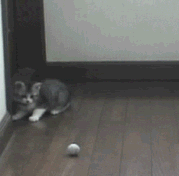Unfortunately, you can't have it both ways.
I've had a few people ask me why Volt is not allowed to bark or growl, so I put some thought into it. As puppy raisers, we train our guide-dog pups from day one that barking (and growling) is unacceptable and it is always discouraged. When our pups are small, we simply say "no" and hold their mouths closed gently to stop them barking or growling, as they get older and stronger, the "no" still applies and we add "quiet", praising them when they stop. We also use "leave it" when their attention is drawn to something other dogs are barking at. And a big part of our pups training is praising them when they react appropriately to a situation, like when someone rings the doorbell and Volt sits quietly next to me at the door- even though his tail is wagging furiously on the floor behind him!
There are several reasons for guide-dogs not being guard-dogs, but the three biggest ones are as follows.
>> Point number one, and probably the most important issue, is that guide-dogs receive intense training to focus on guiding their blind partner around every day life. They have to focus and concentrate on obstacles and pathways and safety when they are working, and they won't be able to decide whether its safe for their blind partner to cross the street (for example) if they're watching oncoming people and barking at possible threats as well!
>> Secondly, visually impaired people are assisted by many people in their every day life. A barking guide-dog may well scare away someone who wants (or needs) to help the dog's partner.
>> A third point is that nowadays, many residential complexes and apartment blocks do not allow pets at all, but exceptions are made for guide-dogs. Lets be honest, a barking dog can be an irritation, so a dog that barks at visitors, or neighbours walking past the doors or windows, is not going to go down well with a blind person's neighbours.
One exception to this rule is for service dogs- the dogs that are partnered with people who have a disability other than blindness, like cerebral palsy or epilepsy- a part of their training is to "speak" to draw outside attention should their partner need assistance and they are unable to call out.
 |
| click on the puppy to make a donation to SAGA |
Don't forget to check out the Twitter hash-tag #SAGApupVolt to see regular updates on my puppy raising adventure!
Follow @SAGuide_Dogs on Twitter!
Follow @SAGuide_Dogs on Twitter!













0 comments:
Post a Comment